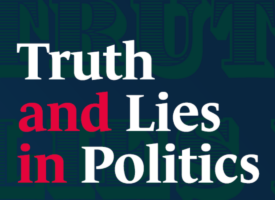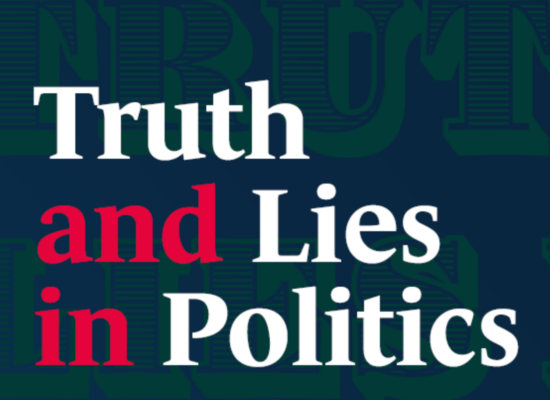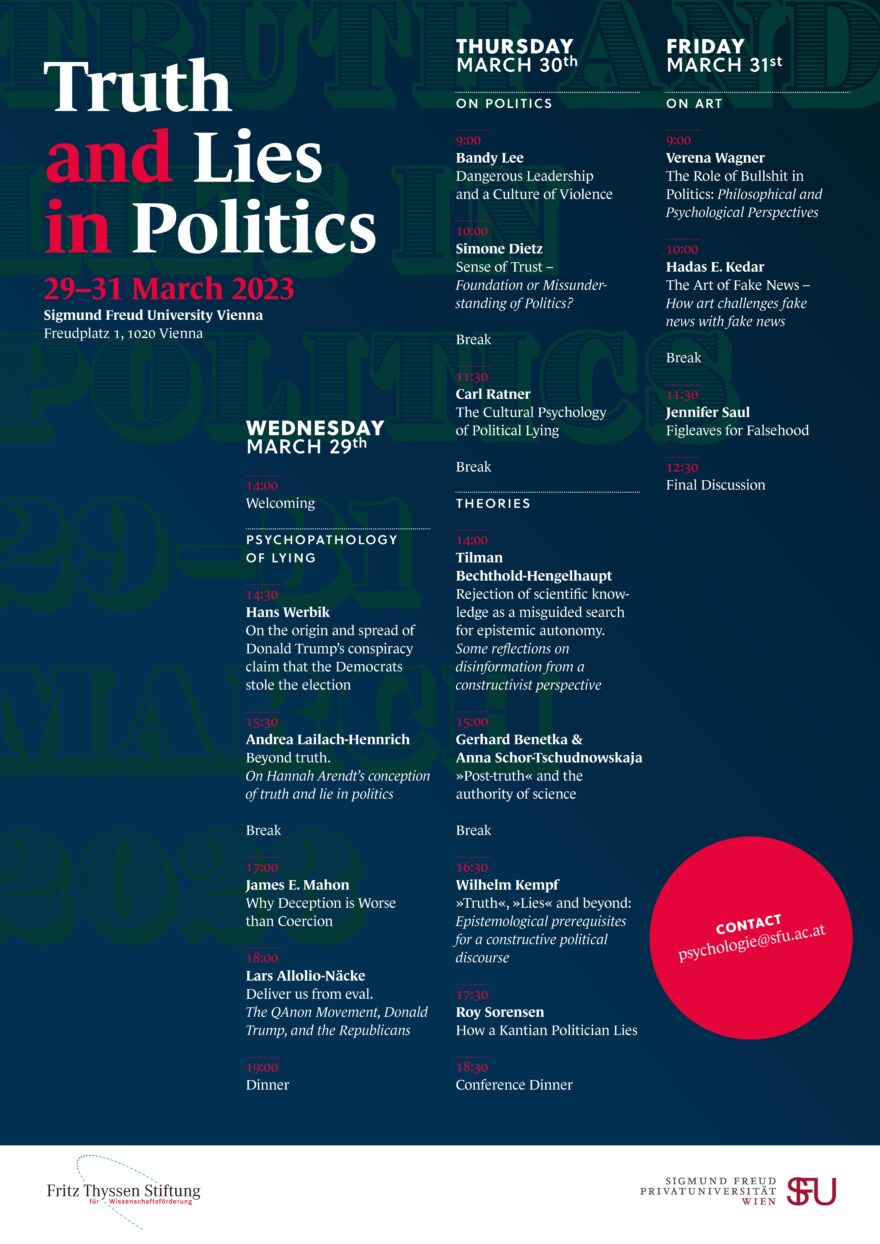The Fritz Thyssen Foundation & Sigmund Freud University hereby invite you to the
Conference on „Truth and Lies in Politics“
29-31 March 2023 | SFU Vienna, Freudplatz 1, Room 2002
Conference fee:
Regular fee: 30 EUR | Students: 15 EUR
The fee is a flat rate for all three days. Please note that it is not possible to pay partial amounts for participating in individual days. Payments are made on site on the days of the conference.
Conference Description:
Scientific Objectives
“No one has ever doubted that truth and politics are on rather bad terms with each other, and no one […] has ever counted truthfulness among the political virtues.”
With this startling comment Hannah Arendt begins her profound analysis of the significance of lying and truth in the political realm. And she adds: “Lies have always been regarded as necessary and justifiable tools not only of the politician’s or the demagogue’s but also of the statesman’s trade.” (Arendt 2000: 545) In times of fake news and “alternative facts” the question still stands how we should understand the relation between truthfulness and lying in the realm of politics. One might think that virtues such as mutual trust and truthfulness are prerequisites for political communication. However, if there is some truth to Arendt’s claim the assumption that politicians are in one way or another committed to the truth might be unjustified. The conference will address this question in an interdisciplinary way by bringing together outstanding philosophers and psychologists who have been researching the topic of truth and lies for years.
The scientific aims of the conference can be divided into four main areas:
1. conceptual questions,
2. the question of scientific knowledge in politics,
3. the relation between lying and politics, and
4. the interdisciplinary exchange between philosophy and psychology.
Note that the main areas are not necessarily congruent with clusters, which arrange the conference according to different thematic points.
Conceptual Questions
Although the theoretical debate about the phenomenon of lying has a tradition dating back to Plato, Aristotle, Augustine and Thomas Aquinas (Lotter 2017) there is no common definition of lying (Derrida 1997). The most widely accepted definition is the following: To lie is “to make a believed-false statement to another person with intention that the other person believe that to be true” (Mahon 2016). Consider a person who states that Covid-19 is no different than common flu. This person is lying if and only if they believe that Covid-19 is no flu but claim it anyway in order to convince someone else that Covid-19 is indeed flu (see Saul 2000, 2012).
According to this definition there are four necessary conditions:
1. The statement condition requires that in order to lie a person has to make a statement.
2. The untruthfulness condition requires that the person should believe the statement to be false.
3. The third condition – addressee condition – requires that the untruthful statement is made to another person.
4. At last, the intention to deceive condition states that a person is lying if she intends that the other person believes the untruthful statement to be true.
All conditions have been challenged in one way or another (Fallis 2009, 2010; Mahon 2007, 2008; Sorensen 2007; Stokke 2013a, 2013b). These conceptual issues become particularly relevant when different phenomena need to be distinguished from one another. In order to understand whether bullshitting or fake news are forms of lying, one should understand how the concept “lying” is defined (Frankfurt 1986, Jaster & Lanius 2019). By discussing phenomena such as “bullshitting” (talk by Jaster & Lanius), “fake news” (talk by Kedar) or the phenomenon of “figleaves” (talk by Saul), one aim of the conference is to contribute to a better understanding of the concept of lying (talks by Mahon, Sorensen) and how it relates to other phenomena of deception such as conspiracy theories, propaganda or populism (talk by Kempf).
Scientific Knowledge
Political communication and its role in politics has changed a lot compared to the time when Hannah Arendt made the remark quoted above. The main reason is that global crisis such as climate change or the Covid-19 pandemic involve scientific stance towards certain problems that can be solved only politically. However, reference to scientific facts determines how speakers should behave with respect to the truth of what is claimed: they should accept it. If it is true, then Arendt’s claim that “[lies have always been regarded as necessary and justifiable tools […]” should be refuted. It is an important goal of the conference to shed more light on the relation between scientific knowledge and political lying.
In previous research on the subject of “lying”, the question of the relationship between scientific knowledge and the political lie has received little attention. At this point the conference can fill a research gap. For this reason, the increasing importance of scientific knowledge in politics takes center stage in the argument of several participants, both psychologists (talks by Benetka, Bechthold-Hengelhaupt) and philosophers (talk by Dietz).
Lying and Politics
In addition to the concrete topics mentioned above, a further scientific objective is to give an overview of the possible questions and issues that are addressed by the topic of “Truth and Lies in Politics”. One issue concerns the moral status of lying (talks by Mahon, Sorensen). There is an intense debate about the extent to which political decision should be guided by moral considerations (Sandel 2006). It is clear that lying is morally reprehensible, but the threat posed by political lies also affects other areas of human interaction such as mutual trust (Dietz 2017, Williams 2002). It is the loss of trust that comes from lying which again can have a notably devastating effect on interpersonal relations in general and on democracy in particular (talks by Lailach-Hennrich, Lee).
While philosophers look at the question of the relations between lies and politics in a more abstract way, psychologists look at concrete cases. Especially, the analysis of recent experiences with Donald Trump or the QAnon movement enriches the understanding of the phenomenon of political lying. At this point it becomes clear that the interdisciplinary orientation of the conference facilitates a comprehensive consideration of truth and lies in politics. This leads us to the final scientific aim of the conference.
Interdisciplinary Cooperation between Philosophy and Psychology
Cooperation between philosophers and psychologists can prove greatly beneficial for both disciplines when directed towards a common interest in knowledge, here in the specific case of the topic “Truth and Lies in Politics”. Inherent to the intention to deceive and to lie is a mental phenomenon that is studied by both, from a psychological and a philosophical perspective. What makes this conference exceptional is the fact that the phenomenon of lying is not examined as such but in the context of politics. The scientific aim of a successful interdisciplinary cooperation can therefore be extended to include another goal, namely a social. For the question of truth and lies in politics points beyond science; it is crucial to society as a whole. Hence, the conference gathers outstanding scholars who have done extensive research on the subject in question.
The conference was initiated and initially planned by Prof. Hans Werbik, Professor of Psychology em., who hoped this collaboration to gain great knowledge and new insights. Prof. Werbik passed away unexpectedly in December 2021. In his honor, the conference will be opened with the paper he had written on the topic of “Truth and Lies in Politics” shortly before his untimely death.
Literature
- Arendt, H. (2000), The portable Hannah Arendt, edited with an introduction by Peter Baehr, London: Penguin Books.
- Derrida, J. (1997), History of the Lie: Prolegomena, in: Graduate Faculty Philosophy Journal, 19 (2/1): p. 129-61.
- Dietz, S. (2017), Die Kunst des Lügens, Stuttgart: Reclam.
- Fallis, D. (2009), What is Lying?, in: Journal of Philosophy, 106: p. 29-56.
—, (2010), Lying and Deception, in: Philosophers’ Imprint, 10: p. 1-22. - Frankfurt, H.G. (1986), On Bullshit, in: Raritan, 6: p. 81-100.
- Jester, R. & Lanius, D. (2019), Die Wahrheit schafft sich ab. Wie Fake News Politik machen, Stuttgart: Reclam.
- Lotter, S.M. (2017), Die Lüge. Texte von der Antike bis in die Gegenwart, Stuttgart: Reclam.
- Mahon, J.E., The Definition of Lying and Deception, in: The Stanford Encyclopedia of Philosophy (Winter 2016 Edition), edited by N. Zalta, URL: https://plato.stanford.edu/archives/win2016/entries/lying-definition/.
—, (2007), A Definition of Deceiving, in: International Journal for Applied Philosophy, 21: p. 181-94.
—, (2008), Two Definitions of Lying, in: International Journal for Applied Philosophy, 22: p. 211-30. - Sandel, M.J. (2005), Public Philosophy: Essays on Morality in Politics, Harvard: Harvard University.
- Saul, J. (2000), Did Clinton say something false?, in: Analysis, 60: p. 255-7.
—, (2012), Lying, Misleading, and What Is Said, Oxford: Oxford University Press. - Sorensen, R. (2007), Bald-Faced Lies! Lying Without the Intent to Deceive, in: Pacific Philosophical Quarterly, 88: p. 251-64.
- Stokke, A. (2013a), Lying and Asserting, in: Journal of Philosophy, 110: p. 33-60.
—, (2013b), Lying, Deceiving, and Misleading, in: Philosophy Compass, 8: p. 348-59. - Williams, B (2002), Truth and Truthfulness: An Essay in Genealogy, Princeton: Princeton University Press.
Programme Overview:
(Click to enlarge)
We look forward to your participation!
Sigmund Freud University Vienna
Faculty of Psychology
Freudplatz 1, 1020 Vienna
Tel: +43 1 798 40 98 500
Email: psychologie@sfu.ac.at


 Conference Description
Conference Description 